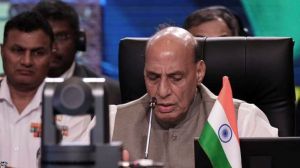Three ministries censured in Purulia case
NEW DELHI, May 7: A Parliamentary committee has charged the ministries of home, defence and civil aviation with "collective irresponsi...

NEW DELHI, May 7: A Parliamentary committee has charged the ministries of home, defence and civil aviation with "collective irresponsibility" over the Purulia arms dropping case.
In a report tabled in Parliament today, the Committee on Government Assurances said during their appearance the representatives from the three ministries showed an “uncanny skill in blaming each other” for not preventing the December 1995 arms drop by a foreign aircraft.
“Each ministry tried to justify its inaction and said it was the job of the other ministry,” the committee headed by Muslim League MP E Ahamed said. The committee accepted the “frank admission” by Home Secretary K Padmanabhaiah that there was “total failure on the part of governmental agencies and that there was total lack of coordination among them”.
The Home Secretary told the committee that the Intelligence Bureau had alerted the Ministry about the possibility of an arms drop around Dhanbad in Bihar close to the date when it actually took place. The Home Secretary alerted the Defence Ministry and the Bihar Government and later sent a “routine letter” to the West Bengal Government. The committee noted the “startling fact” that Home Secretary had not passed on the intelligence information to the Directorate General of Civil Aviation (DGCA) and the Civil Aviation Ministry. Since the DGCA gives permission to aircraft to fly over India, this was a serious lapse.
The Home Secretary conceded before the committee that there was a “total security foul-up” at the Bombay airport where the aircraft was forced to land by the Air Force on its return journey. This enabled Kim Davy, the main suspect, to escape.
The Air Force had not informed anybody about it, resulting in a communication gap with the security agencies, the report said.
The Defence Ministry was also pulled up for neither acting on the intelligence it received from the Home Ministry, nor sharing it with the DGCA.
While it was true that the Air Force did not have radar surveillance throughout the country to monitor the movement of civilian aircraft, it could have co-ordinated with the DGCA to track down the flight, said the report.
The committee did not agree with the Defence Secretary’s argument that it was a case of aerial smuggling, which was different from an air threat. The plane which dropped arms could have dropped bombs on a selected target, it said. Airport authorities at Varanasi, where the plane halted for four hours with the arms on board, also came in for criticism.
The committee seemed to agree with the Civil Aviation Secretary’s statement that it was “sheer luck” that the plane was identified just two hours before it was due to fly out of India. The Home Secretary and the CBI told the committee that on the basis of the investigation, it was clear that the arms were meant for Anand Margis.






- 01
- 02
- 03
- 04
- 05

























